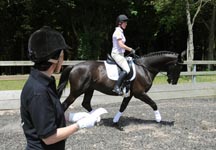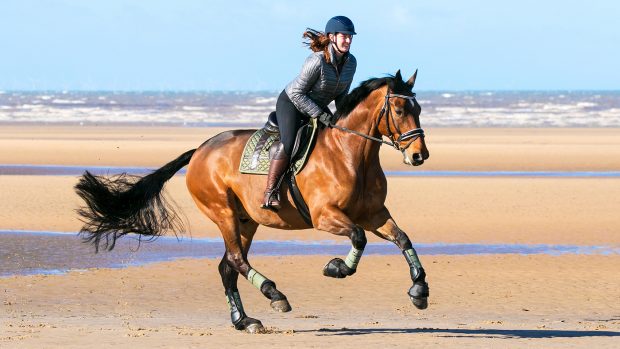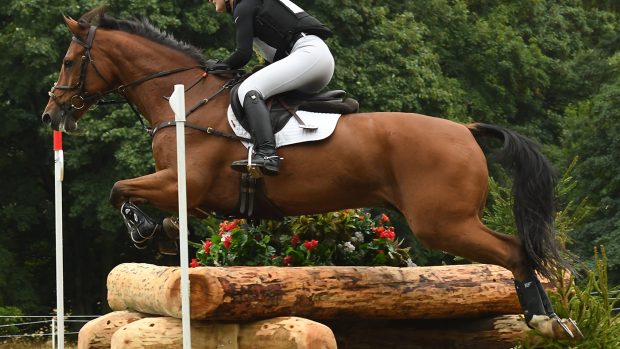View horses for sale
What is a schoolmaster?
A schoolmaster is a horse with the experience and the ability to help a rider learn and perfect certain skills.
“The rider who benefits from a schoolmaster is one who is learning what’s involved when it comes to riding dressage movements, show jumping courses or cross-country jumps,” says international dressage and event rider Christopher Bartle, from Yorkshire.
“He’ll help to give the rider a feel, and, to a certain extent, confidence.”
Dressage coach Andrew Day, from Nottinghamshire, adds: “A schoolmaster used to be a horse that was so dull and insensitive that anybody could safely ride him. But a schoolmaster is not actually a school horse – he’s a specialist in his field. A genuine schoolmaster, who is correctly trained to a high level, will cost a great deal of money.”
The right skills
Schoolmasters are often specialists in certain skills. If you’re hoping to learn tempi changes, the horse may be incredible at them, but his trot work may not be so good. Or perhaps he is a very good show jumper, but has a weakness over certain jumps or is limited in his scope.
Make sure the horse you are looking at is good at what you want to learn, and don’t make the mistake of assuming you can retrain him. A schoolmaster may not have the ability to learn new things.
If you’re looking for a horse to give you an introduction to competition, then finding one with a good attitude is vital.
“He shouldn’t be complicated or spooky in competition,” says Christopher. “And he needs to be bold, even if he’s a bit lazy and uninspiring at home.”
There are certain things any good schoolmaster should be, such as:
- Willing: The horse may not be the best mover in the world, but if he accepts the rider’s aids and keeps thinking forward, then the rider will be able to learn.
- Well trained: “A good schoolmaster should understand correct aids, even if his response is only modest,” says Andrew. “If you have to exaggerate your aids, or use an incorrect aiding system, you are not going to learn correctly.” A true schoolmaster will ignore incorrect aids and only go to correct ones.
- Vice-free: “A schoolmaster should not be too sharp in his reactions, yet there should be a balance between willingness and quickness of reaction,” says Christopher.
No matter what the horse has to offer, if you don’t feel secure with him, or you’re frightened by his reactions, you won’t be able to learn, particularly if you’re a nervous rider.
- Comfortable: “If a rider has to distort his or her body in order to ride the movements, or is unable to maintain a good, deep and adhesive seat, it will be difficult to progress. Real progression requires the rider to have a consistent seat,” explains Andrew.
Ask the vendor the following questions:
- Does the horse need any special care or medications?
It may not be a good idea to make radical changes to his health regime, so make sure you can afford special upkeep, if necessary.
- Will he need extra time to warm up?
A schoolmaster is unlikely to be less than 12 to 13 years old, but this is not a major factor. Experience demands age and, therefore, the horse may be stiffer and need more time under saddle before he is properly warmed up and able to perform at his best. If he’s fit and well, he can still offer many years of learning and enjoyment.
- Why is the horse a schoolmaster rather than a competition horse?
“It may just be because of his age,” says Andrew. “Or because of the regularity of the gait, or some quirk that holds him back in competition. If he has a lack of expression and brilliance in the paces, but is happy to perform the movements, then the vendor may have discovered his talents as a schoolmaster rather than a competition horse.”
Above all, make sure the horse is a schoolmaster and not a school horse. Many horses in the marketplace are passed off as schoolmasters when they don’t really qualify.
Andrew Day says: “Some ‘schoolmasters’ are actually dull and non-reactive horses whose training has gone wrong. To ride such a horse is usually a horrid experience because he is often resistant, tense and confused. As a result of poor training, he may have an impaired gait, which makes him awkward and uncomfortable to ride.”
View horses for sale
Buying a new horse? Compare insurance prices at horseandhound.co.uk/insurance




